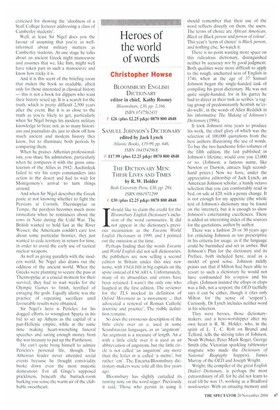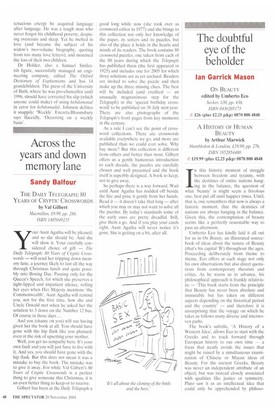Heroes of the world of words
Christopher Howse
BLOOMSBURY ENGLISH DICTIONARY editor in chief, Kathy Rooney Bloomsbury, £30, pp. 2,166, ISBN 0747562431 't £26 (plus £2.25 p&p) 0870 800 4848 SAMUEL JOHNSON'S DICTIONARY edited by Jack Lynch Atlantic Books, £19.99. pp. 646, ISBN 184354296X (in £17.99 (plus £2.25 p&p) 0870 800 4848 THE DICTIONARY MEN: THEIR LIVES AND TIMES by R. W. Holder Bath Untversity Press, £30, pp. 294, ISBN 0861971299 (4) £30 (plus £2.25 p&p) 0870 800 4848
should like to claim the credit for the
'should like English Dictionary's inclu
sion of the word carminative. It did not appear in the dictionary's previous incarnation as the Encarta World English Dictionary in 1999, and I pointed out the omission at the time.
Perhaps finding that the words Encarta and World English did not sell dictionaries, the publishers are now selling a second edition in Britain under this nice new name, with ENGLISH in big capitals on the spine instead of ENCARTA. Unfortunately, many of its absurdities and errors have been retained. I wasn't the only one who laughed at the first edition. The reviewer for the TLS mocked its definition of Oxford Movement as 'a movement ... that advocated a renewal of Roman Catholic doctrine and practice'. The risible definition remains.
So does the erroneous description of the little circle over an a, used in some Scandinavian languages, as an 'angstrom'. An angstrom is a measure of length. An a with a little circle over it is used as an abbreviation of angstrom, but the little circle is not called 'an angstrom' any more than the letter m is called 'a metre', but rather 'em'. The Encarta/Bloomsbury dictionary-makers were told all this five years ago.
Bloomsbury has slightly curtailed its ranting note on the word nigger. Previously it said. 'Those who persist in using it should remember that their use of the word reflects directly on them, the users. The terms of choice are African American, Black or Black person and person of colour'. This year's 'term of choice' is Black person, and nothing else. So watch it.
There is no point wasting more space on this ridiculous dictionary, distinguished neither by accuracy nor by good judgment.
Both qualities were more difficult to apply to the rough, uncharted seas of English in 1746, when at the age of 37 Samuel Johnson began the single-handed task of compiling his great dictionary. He was not quite single-handed, for in his garret he had to direct in their task as scribes 'a ragtag group of predominantly Scottish ne'er do-wells', in the words of Allen Reddick in his informative The Making of Johnson's Dictionary (1996), It took Johnson nine years to produce his work, the chief glory of which was the selection of 100,000 quotations from the best authors illustrating the use of words. To buy the two handsome folio volumes of the fifth edition, the last published in Johnson's lifetime, would cost you £3,000 or so. (Johnson, a famous name, like Newton or Darwin, attracts high second hand prices.) Now we have, under the appreciative editorship of Jack Lynch, an American Johnson scholar, a handy octavo selection that you can comfortably read in bed, on sale at £20, with a penny change. It is not enough for my appetite (the whole text of Johnson's dictionary may be found on the internet), but it is enough to show Johnson's entertaining excellences. There is added an interesting index of the sources for the quotations, author by author.
There was a fashion 20 or 30 years ago for criticising Johnson as too prescriptive in his criteria for usage, as if the language could be burnished and set in amber. But Johnson's Plan for the dictionary and its Preface, both included here, read as a model of good sense. Johnson mildly points out that if Milton had been able to resort to such a dictionary he would not have confounded his scorpion and his ellops. (Johnson insisted the ellops or elops was a fish, not a serpent; the OED tactfully says it can be either, though it cites only Milton for the sense of `serpent'). Curiously, Dr Lynch includes neither word in his selection.
They were heroes, those dictionarymakers, and a hero-worshipper after my own heart is R. W. Holder, who, in the spirit of L. T. C. Rolt on Brunel and Telford, tells the stirring tales of Johnson, Noah Webster, Peter Mark Roget, George Smith (the Victorian sparkling tablewater magnate who made the Dictionary of National Biography happen), James Murray of the OED and Joseph Wright.
Wright, the compiler of the great English Dialect Dictionary, is perhaps the most extraordinary of all, for he did not learn to read till he was 15, working as a Bradford wool-sorter. With an amazing memory and tenacious energy he acquired language after language. He was a tough man who never forgot his childhood poverty, despising overcoats and sleep. Yet he melted in love (and became the subject of his widow's two-volume biography, quoting from too many love letters), and mourned the loss of their two children.
Dr Holder, also a Samuel Smilesish figure, successfully managed an engineering company, edited The Oxford Dictionary of Euphemisms and has 14 grandchildren. The press of the University of Bath, where he was pro-chancellor until 1996, should have corrected his slip (which anyone could make) of using hebdomonal in error for hebdomadal. Johnson defines it snappily: 'Weekly'. Encarta/Bloomsbury says flaccidly, 'Occurring on a weekly basis'.



























































































 Previous page
Previous page